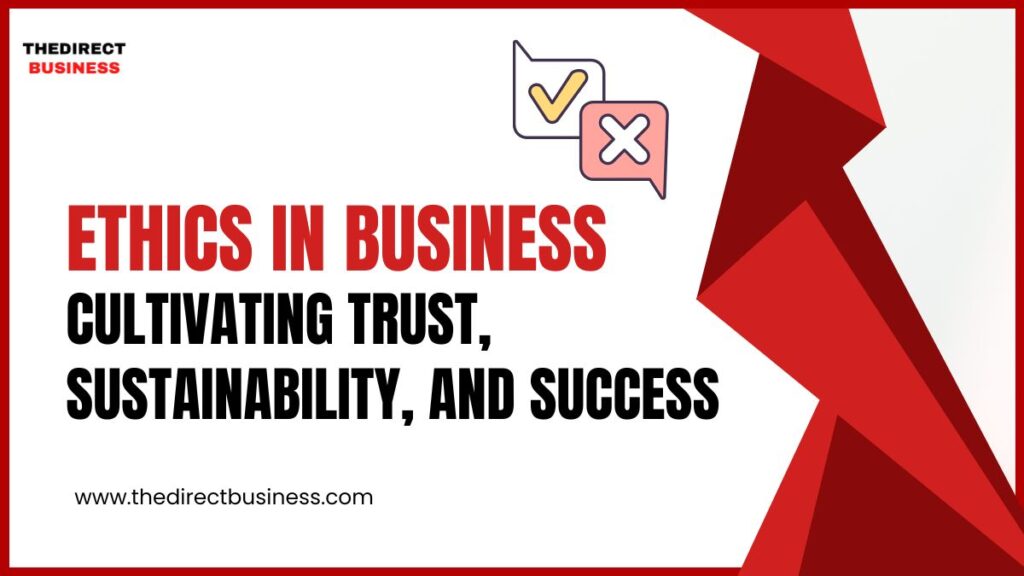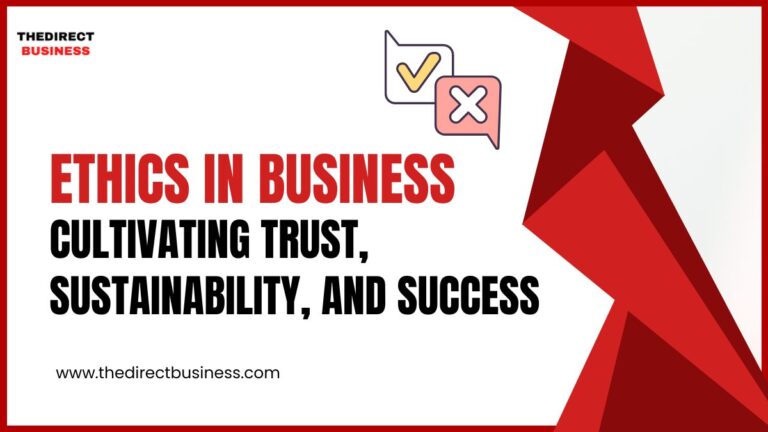Table of Contents
Introduction
In today’s complex and interconnected commerce scene, ethical practices have gotten to be more basic than ever. Companies are progressively realizing that conducting commerce with judgment isn’t fair a ethical commitment, but too a vital advantage. This article investigates the concept of business ethics and its importance in cultivating belief, advancing maintainability, and accomplishing long-term victory.

Through an in-depth examination of key ethical standards, case ponders, and industry patterns, we dive into the different viewpoints of ethical decision-making, corporate social duty, natural stewardship, and partner engagement. By understanding the suggestions and benefits of ethical behavior, organizations can explore moral situations, ensure their notoriety, and contribute to a more ethical and feasible commerce environment.
Definition of Business Ethics
Business ethics alludes to the standards and ethical values that direct the behavior and decision-making of individuals and organizations within the business world. It envelops a wide extent of ethical contemplations, counting trustworthiness, judgment, reasonableness, straightforwardness, and regard for partners.
The Advancement of Business Ethics
The concept of business ethics has advanced over time, impacted by societal changes, legitimate improvements, and corporate outrages. From its early roots in devout and philosophical lessons, commerce morals have developed as a crucial teaching that addresses the ethical challenges confronted by organizations in an energetic worldwide environment.
Significance of Business Ethics within the Cutting edge Setting
In today’s trade scene, characterized by globalization, expanded open investigation, and increased desires from partners, ethical behavior is significant. Receiving and practicing commerce morals offers various benefits, counting improved notoriety, client dependability, worker engagement, and long-term productivity.
Key Takeaways 1. Business ethics is not only an ethical commitment but also a vital advantage in today's complex and interconnected business landscape. 2. Ethical practices are essential for building trust, fostering sustainability, and achieving long-term success in business. 3. Corporate social responsibility (CSR) enhances brand reputation, customer loyalty, and stakeholder relations. 4. Ethical leadership sets the tone, fostering an ethical culture and driving employee morale and organizational performance.
Moral Decision-Making
Ethical Systems and Hypotheses
Different ethical systems and hypotheses give direction for ethical decision-making. This segment investigates consequentialism, deontology, ideals ethics, and other unmistakable moral hypotheses, highlighting their application in real-world trade scenarios.
Variables Impacting Ethical Decision-Making
Ethical decision-making is impacted by a few components, such as personal values, organizational culture, social standards, and outside weights. Understanding these impacts makes a difference in people and organizations exploring moral problems more successfully.
Adjusting Ethical Contemplations with Commerce Destinations
Whereas ethics and trade destinations may some of the time show up to be in struggle, it is conceivable to discover an adjustment. This area talks about procedures for adjusting moral contemplations with organizational objectives and illustrates that ethical behavior can contribute to long-term commerce victory.
Corporate Social Obligation (CSR)
Understanding CSR and Its Key Components
Corporate social duty (CSR) alludes to a company’s intentional activities to address social, natural, and ethical issues. This segment investigates the key components of CSR, counting magnanimity, natural maintainability, moral sourcing, and worker welfare.
Benefits and Challenges of Actualizing CSR
Executing CSR activities brings various benefits, such as progressed brand notoriety, expanded client devotion, and way better partner relations. In any case, it moreover postures challenges, counting asset allotment, partner desires, and measuring social effect.
Case Considers: Commendable CSR Activities
Looking at effective CSR activities from companies like Patagonia, TOMS, and Unilever gives real-world illustrations of how moral hones and feasible activities can drive trade success while emphatically affecting society.
Natural Ethics and Maintainability
The Concept of Natural Ethics
Natural ethics centers on the ethical commitments of people and organizations toward the normal environment. This segment investigates the significance of natural morals in commerce decision-making and the part of maintainability in making a more moral trade biological system.
The Part of Commerce in Natural Maintainability
Businesses have a critical effect on the environment, and receiving maintainable hones is fundamental for moderating climate alter, protecting characteristic assets, and minimizing contamination. This segment highlights the trade case for natural supportability and gives techniques for actualizing feasible hones.
Techniques for Executing Maintainable Trade Practices
To integrate maintainability into their operations, companies can embrace different techniques such as setting clear supportability objectives, actualizing green supply chains, advancing vitality proficiency, and locking in circular economy hones. This segment examines these procedures and their potential benefits.
Moral Authority and Organizational Culture
The Significance of Moral Administration
The moral authority sets the tone for an organization’s ethical behavior. This segment investigates the characteristics of ethical pioneers, the part of pioneers in making an ethical culture, and the effect of ethical authority on worker resolve and organizational execution.
Making an Ethical Organizational Culture
Building an ethical organizational culture requires cultivating ethical values, advancing open communication, setting up ethical rules, and actualizing components for detailing ethical concerns. This segment gives bits of knowledge about making and maintaining an ethical culture.
Ethical Authority Case Ponders
Looking at moral administration in real-world scenarios, such as the activities of Starbucks CEO Howard Schultz amid the racial predisposition occurrence and the reaction of Johnson & Johnson’s CEO amid the Tylenol emergency, offers profitable lessons and motivation for yearning for moral pioneers.
Partner Engagement and Ethical Connections
Distinguishing and Prioritizing Partners
Partners play a pivotal part in forming an organization’s ethical scene. This segment talks about the distinguishing proof and prioritization of partners, the significance of partner engagement, and the moral obligations that organizations have towards their partners.
Methodologies for Successful Partner Engagement
Compelling partner engagement includes building belief, keeping up open lines of communication, considering differing points of view, and consolidating partner input into decision-making. This area investigates techniques for effective partner engagement and the benefits it brings.
Ethical Challenges in Partner Connections
Whereas partner engagement is vital, it moreover presents moral challenges. Clashing interfaces, control-lopsided characteristics, and moral situations can emerge in partner connections. This area looks at these challenges and offers approaches to address them morally.
Ethical Challenges within the Advanced Age
Information Protection and Cybersecurity
The advanced age has brought forward modern ethical challenges. This segment centers on information security and cybersecurity concerns, investigating issues such as information breaches, observation, the moral utilization of client information, and the obligation of companies to ensure client data.
Ethical Suggestions for Artificial Insights
As manufactured insights (AI) gets to be progressively predominant, moral contemplations in AI improvement, decision-making calculations, and AI-driven computerization have to be tended to. This area looks at the moral suggestions of AI and investigates the significance of responsible AI hones.
Exploring Ethical Challenges within the Advanced Scene
To explore ethical challenges within the computerized scene, organizations must embrace moral systems for information security, set up vigorous cybersecurity measures, prioritize straightforwardness, and advance capable AI improvement. This area gives experience in tending to these challenges.
Commerce Ethics Over Businesses
Ethics in Fund and Banking
The funding and managing an account industry faces interesting moral challenges, counting clashes of intrigued, insider exchanging, and predatory loaning hones. This segment investigates morals in fund, and administrative measures, and endeavors to reestablish belief within the industry.
Ethics in Innovation and Development
Within the fast-paced world of innovation and advancement, ethical contemplations are significant. This area examines the ethical suggestions of rising innovations, mental property rights, social media morals, and the obligation of tech companies in forming ethical innovation utilization.
Ethics in Healthcare and Pharmaceuticals
The healthcare and pharmaceutical businesses experience moral challenges related to understanding care, getting to pharmaceuticals, clinical trials, and showcasing hones. This area investigates ethical issues in healthcare and pharmaceuticals, emphasizing the significance of patient-centered care and ethical investigation.
Case Ponders: Ethical Problems and Lessons Learned
Enron: A Cautionary Story
The Enron embarrassment serves as a conspicuous case considering highlighting corporate moral disappointments. This segment looks at the deceptive hones that driven to Enron’s destruction and the lessons learned in terms of corporate administration, responsibility, and the part of moral authority.
Patagonia: Adjusting Benefit and Natural Obligation
Patagonia’s commitment to natural supportability gives a positive case consideration. This area investigates Patagonia’s moral activities, such as its supply chain straightforwardness, backing for natural causes, and its “Do not Purchase This Coat” campaign.
Volkswagen’s Outflows Outrage: Moral Aftermath and Modifying Believe
The Volkswagen outflows embarrassment exhibits the results of unscrupulous behavior. This area digs into the moral infringement, the effect on partners, and the consequent endeavors made by Volkswagen to recapture belief and modify its notoriety.
Advancing Ethical Behavior and Responsibility
Ethics Preparing and Instruction
Advancing moral behavior requires comprehensive ethics preparation and instruction. This area examines the significance of ethics preparing programs, the part of pioneers in fostering an ethical environment, and the benefits of ethical instruction for representatives.
Whistleblowing and Announcing Components
Setting up successful whistleblowing and announcing components energizes representatives to talk up around deceptive hones. This segment investigates the noteworthiness of whistleblower security, the part of mysterious detailing channels, and the effect of whistleblowing on organizational morals.
Ethics Reviews and Corporate Administration
Ethics reviews offer assistance organizations evaluate and screen their moral execution. This segment looks at the part of morals reviews, the importance of vigorous corporate administration structures, and the integration of moral contemplations into hazard administration and compliance systems.
Conclusion
The Future of Business Ethics
As commerce scenes advance, the significance of morals will proceed to develop. This segment reflects on developing moral challenges and trends, such as social and natural activism, partner capitalism, and the part of innovation in forming ethical behavior.
Grasping Ethical Hones for Long-Term Victory
Concluding the article, this area emphasizes the noteworthiness of ethical hones in building belief, advancing maintainability, and accomplishing long-term victory. By grasping and prioritizing business ethics, organizations can explore ethical predicaments, ensure their notoriety, and contribute to a more ethical and sustainable business environment.
Q: What is business ethics?
A: Business ethics refers to the principles and moral values that guide the behavior and decision-making of individuals and organizations within the business world. It encompasses considerations such as integrity, fairness, transparency, and respect for stakeholders.
Q: Why is business ethics important?
A: Business ethics is important for several reasons. Firstly, it helps in building trust and credibility with customers, employees, and other stakeholders. Secondly, ethical practices contribute to long-term sustainability and profitability by fostering a positive reputation and customer loyalty. Additionally, it promotes employee engagement, improves stakeholder relationships, and creates a more ethical business environment
Q: What are some benefits of practicing business ethics?
A: Practicing business ethics brings numerous benefits. These include enhanced reputation and brand image, increased customer trust and loyalty, improved employee morale and productivity, better relationships with stakeholders, reduced legal and financial risks, and long-term business success.
Q: What role does corporate social responsibility (CSR) play in business ethics?
A: Corporate social responsibility (CSR) is an integral part of business ethics. It involves voluntary actions taken by companies to address social, environmental, and ethical issues. CSR initiatives can include philanthropy, sustainable practices, ethical sourcing, and employee welfare programs. By practicing CSR, companies demonstrate their commitment to being responsible and ethical corporate citizens.
Also Read : What’s Business Casual and How to dress business casual in 2023
